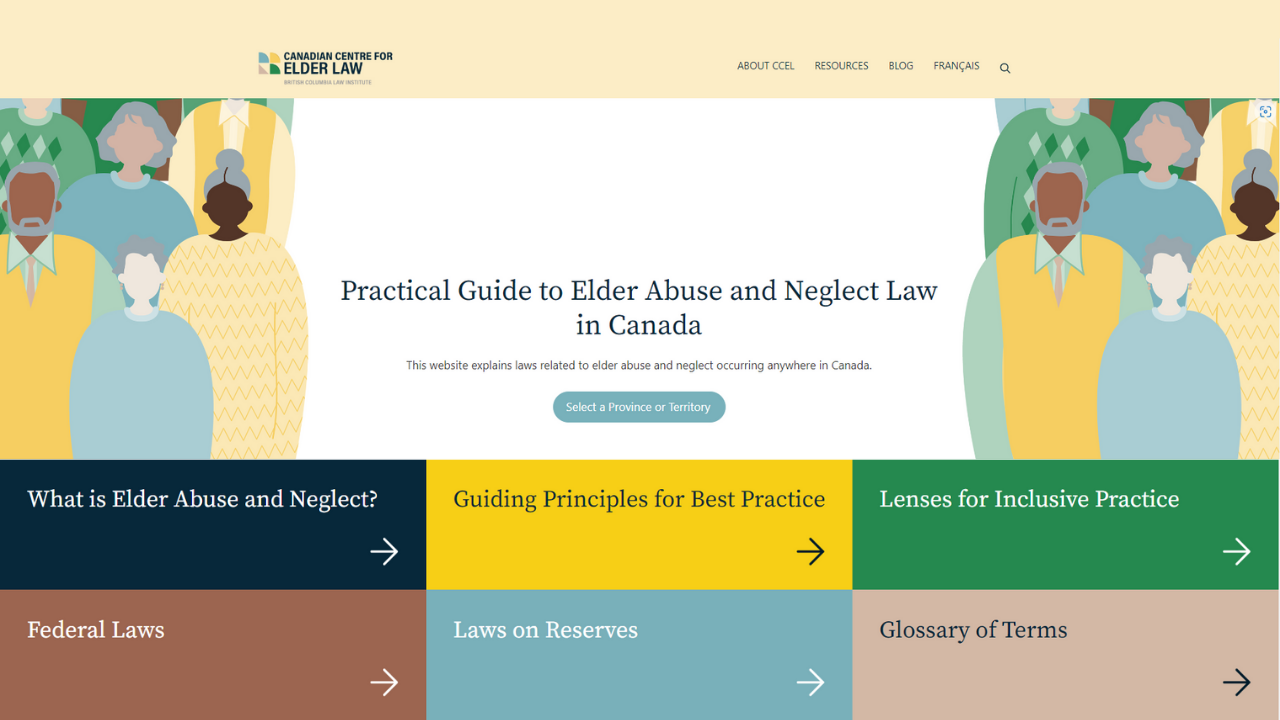Responding to Elder Abuse and Neglect
June 15th is World Elder Abuse Awareness Day. This is a good time to make sure you and your staff understand abuse and neglect law.

The appropriate response to abuse depends on the older person’s unique situation, who is hurting them, and where the abuse is happening. Do they understand what is going on and how to get help? What is your professional relationship with the older person? Perhaps most important: what assistance would they appreciate?
In order to help you in these challenging situations, the Canadian Centre for Elder Law developed the Practical Guide to Elder Abuse and Neglect Law in Canada. This year we launched an updated version of the Practical Guide as a searchable website with printable units. This article reviews central features of the website and key aspects of BC law.
The Practical Guide to Elder Abuse and Neglect Law in Canada: www.ccelderlaw.ca
The laws that apply to abuse and neglect are different everywhere. The Practical Guide contains a module on law and policy in each province and territory.
The BC module covers:
- The adult protection provisions of BC’s Adult Guardianship Act;
- Remedies available under the family violence provisions of BC’s Family Law Act;
- Rules related to abuse occurring in long-term care and assisted living;
- Privacy law, confidentiality, and their impact on elder abuse response; and
- Reporting responsibilities unique to specific professional groups.
We also summarize the various financial substitute decision-makers in BC, their powers and duties, and how to remove their authority if they appear to abusing an older person or their authority.
Each module identifies key contact agencies that provide legal help or victim assistance.
Key Aspects of BC Law
The Adult Guardianship Act requires certain agencies to respond to reports of abuse, neglect, and self-neglect of adults who are unable to seek support and assistance due to restraint, disability, illness, or disease.
The designated agencies in BC are currently
- the five health authorities,
- Providence Health Care, and
- Community Living BC.
The Act grants the designated agencies broad powers of response. In many instances they will offer a tailored support and assistance plan to address health care needs. in emergency situations they may enter premises to forcibly remove the vulnerable person, take them to a safe place, and provide emergency care.
There is no general legal requirement to report abuse or neglect in BC. However, in some situations you are required to respond.
- The Community Care and Assisted Living Act requires operators of assisted living and long-term care facilities to respond to all incidents of abuse and neglect, and to report to specific individuals. Abuse and neglect are considered “reportable incidents” under the Act. You must respond even if you only suspect abuse or neglect.
- Regulated health professionals must report abuse by other regulated health professionals. You must write a report to their college even if the abusive staff person resigns.
- A person who works for a designated agency should contact their supervisor because the agency has an obligation to respond to abuse, neglect, and self-neglect of adults who cannot protect themselves.
- If your program or a client or resident’s care is funded by a designated agency, you are likely expected to contact the funder if you suspect abuse, neglect, or self-neglect.
Best Practices in Elder Abuse Response
Even with a full understanding of law and policy, you may be uncertain of how to respond in an ethical and supportive way. The new Practical Guide addresses this challenge with the following two modules.
A module on “Lenses for Inclusive Practice” contains information on:
- Trauma-informed practice;
- Cultural humility and safety;
- Age, disability, and dementia-friendly practices;
- Gender dynamic related to elder abuse; and
- Sexual orientation and gender identity
The Guide also includes 12 guiding principles for best practice.
In BC we do not have mandatory reporting of abuse. The Adult Guardianship Act applies only to adults who cannot understand their situation or access help on their own. As a society we recognize that competent adults have a right to make their own choices, including living in risky situations.
The Practical Guide was made possible by funding from the Department of Justice Canada Victims Fund, the BC Association of Community Response Networks, and Elder Abuse Prevention Ontario. Please reach out if you would like to partner with us to help keep the Practical Guide current.
To learn more about the Practical Guide you can listen to one of our upcoming webinars. Follow us on Twitter @CCElderLaw or register for our newsletter to get updates with webinar registration information.
Krista James is a lawyer and National Director of the Canadian Centre for Elder Law.





